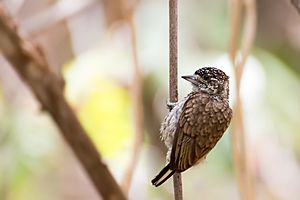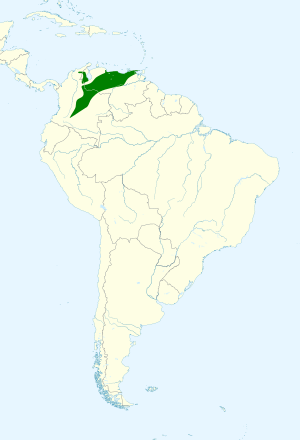Scaled piculet facts for kids
Quick facts for kids Scaled piculet |
|
|---|---|
 |
|
| Female | |
| Conservation status | |
| Scientific classification |
|
| Kingdom: | Animalia |
| Phylum: | Chordata |
| Class: | Aves |
| Order: | Piciformes |
| Family: | Picidae |
| Genus: | Picumnus |
| Species: |
P. squamulatus
|
| Binomial name | |
| Picumnus squamulatus Lafresnaye, 1854
|
|
 |
|
| Script error: The function "autoWithCaption" does not exist. | |
Script error: No such module "Check for conflicting parameters".
The scaled piculet (Picumnus squamulatus) is a small bird. It is part of the woodpecker family, called Picidae. You can find this bird in Colombia and Venezuela.
Contents
About the Scaled Piculet
Different Types of Scaled Piculets
The scaled piculet has five different types, called subspecies. Think of them as slightly different versions of the same bird.
- P. s. squamulatus Lafresnaye, 1854
- P. s. roehli Zimmer & Phelps, 1944
- P. s. obsoletus Allen, 1892
- P. s. lovejoyi Phelps Jr. & Aveledo, 1987
- P. s. apurensis Phelps Jr. & Aveledo, 1987
One of these types, P. s. lovejoyi, might be so similar to others that it doesn't need to be a separate group.
What the Scaled Piculet Looks Like
This tiny bird is about 8 to 9.2 centimeters (3 to 3.6 inches) long. It weighs between 7 and 12 grams (0.25 to 0.42 ounces).
Male and Female Birds
Adult male scaled piculets have a black cap on their head. The feathers on their forehead have red tips. The rest of the cap has white tips. Their face is mostly brown with some black spots. They have a whitish line behind their eye.
Their upper body is olive brown. It looks scaly because each feather has a thin black edge. Their wing feathers are brown. Some of these feathers have yellowish edges. Their tail is brownish black. The two feathers closest to their body are mostly white underneath. The two outer pairs of tail feathers have a white area near the tip.
The chin and throat feathers are white with narrow gray-brown tips. The rest of their belly is whitish. It also has scaly marks, just like their back.
Adult females look almost the same as males. The only difference is that their entire cap has white spots.
Young Birds
Young scaled piculets are darker on their upper body than adults. The scaly pattern on their belly is not as clear.
Subspecies Differences
Each subspecies has small differences in its looks:
- P. s. roehli often has yellow or orange spots on its forehead instead of red ones. Its upper body is brighter. Its belly has a brownish yellow color. The marks on its belly are thinner.
- P. s. lovejoyi always has yellow spots on its forehead. Its upper body is grayer than the main type.
- P. s. obsoletus has a yellow-green tint on its upper body. Its belly is yellowish white. The "scale" marks are lighter and finer. It also has dark streaks in the middle of its feathers.
- P. s. apurensis looks whiter on its belly. The scaly marks are thin and hard to see.
Where Scaled Piculets Live
Their Home Range
The different types of scaled piculets live in specific areas:
- P. s. squamulatus lives in northeastern and central Colombia.
- P. s. roehli is found in northern Colombia and northern Venezuela.
- P. s. obsoletus lives in northeastern Venezuela.
- P. s. lovejoyi is in the very northwestern part of Venezuela.
- P. s. apurensis lives in north-central Venezuela.
What Kind of Places They Like
Scaled piculets live in many kinds of open or partly open areas. These include:
- Forests along rivers (gallery forest).
- The edges of old, untouched forests.
- Newer forests that have grown back (secondary forest).
- Forests where trees lose their leaves.
- Farmlands with scattered trees.
- Pastures.
They can live at heights up to 1,900 meters (6,200 feet) above sea level.
How Scaled Piculets Behave
Staying in One Place
As far as we know, the scaled piculet stays in the same area all year round. It does not migrate.
What They Eat
The scaled piculet eats small insects. It looks for food on thin branches and twigs. It prefers dense plants or small trees. Usually, you will see them alone or in pairs.
Life Cycle and Reproduction
We don't know much about when scaled piculets breed. In Colombia, they seem to breed from October to January. In Venezuela, it might be from April to June, and possibly even to September. Not much else is known about how they raise their young.
Their Calls
The scaled piculet makes a high-pitched, squeaky sound. It sounds like "chi-chi-ch’e’e’chi," and it becomes like a trill at the end.
Status of the Scaled Piculet
The IUCN (International Union for Conservation of Nature) has checked on the scaled piculet. They say it is a species of "Least Concern." This means it is not in danger of disappearing.
The bird lives in a large area. Even though we don't know exactly how many there are, their population seems to be stable. There are no immediate threats to them. People might not notice them often because they are small and quiet. They live in at least two protected areas in Venezuela.
See also
 In Spanish: Picumnus squamulatus para niños
In Spanish: Picumnus squamulatus para niños
 | Emma Amos |
 | Edward Mitchell Bannister |
 | Larry D. Alexander |
 | Ernie Barnes |


